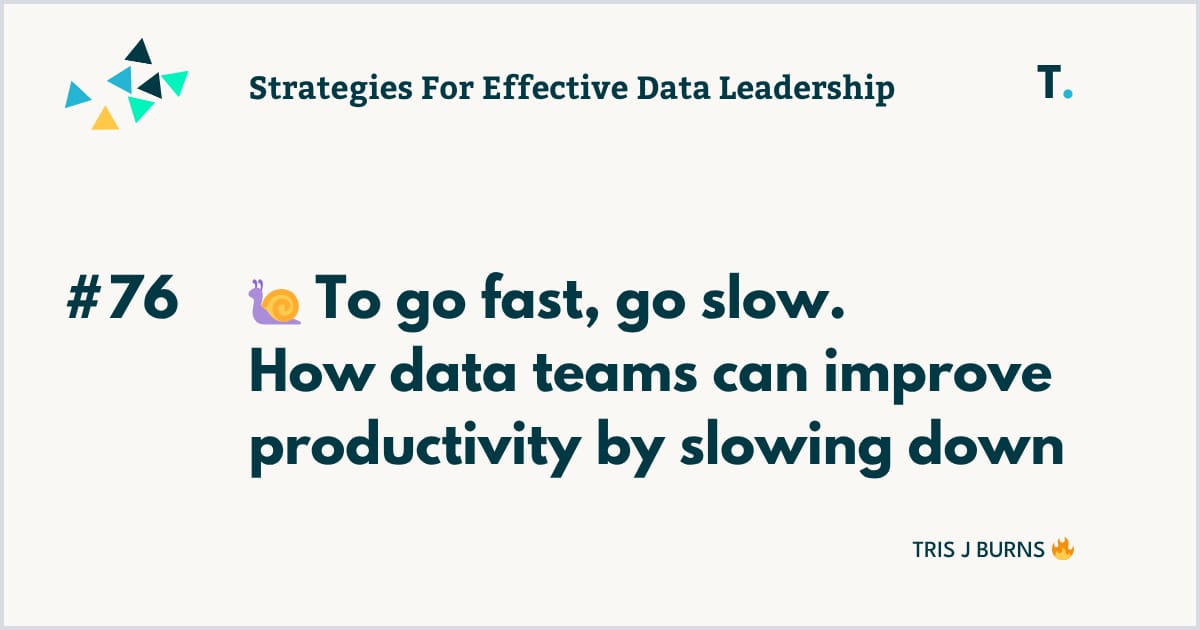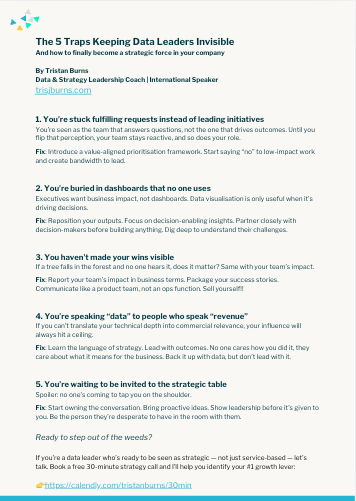
READ TIME: 4 MINUTES
👎🏼 Most data teams are underperforming.
As someone who speaks to data leaders day in day out, it’s abundantly clear to me that most of them (and their teams) feel like they’re underperforming.
It’s not through lack of data skills or expertise, though.
Most of them are wildly proud of their abilities and those of the teams they manage.
They’re underperforming because they’re moving too fast, and thinking too little.
For a lot of teams, the meaning of productivity is often reduced to a sprint through Jira tickets or the completion of other random data request that get flung their way.
The attitude is all based around quick wins, flashy, highly visible dashboards and “just getting sh*t out the door” (most of which goes nowhere).
Requests pile up. Analysts barely have time to think before they’re onto the next meaningless task. And all the while data leaders judge their team’s performance by volume, not impact.
This isn’t productivity. It’s busyness disguised up as progress.

🐢 Less Rush, More Value
What if your data team could produce better work by doing less?
That’s the big idea behind Cal Newport’s book Slow Productivity, and one that I think applies perfectly to the world of data.
In today's post, I'm diving into what Slow Productivity is actually about, why most data teams are currently operating in the exact opposite way, and how managers can start creating the conditions for deeper, more valuable work.
Let’s be honest: most data teams aren’t drowning in work because they lack the hard skills needed to do their job effectively. They’re drowning because they’re stuck in a cycle of reactive delivery, endless requests, and constant context switching. 😫
They’ve got no time to think, and we as leaders are measuring the wrong things.
Slow Productivity offers a better way. A way to refocus on quality, protect thinking time, and reward impact over volume. Let’s take a look at how 👇🏻
📚 This book is also our July pick for the Bad Ass Bookshelf book club which you’re all invited to join! Sign up now in time to vote for our August book!!
But before we go further, a little poll for you:
🧠 How much focused thinking time does your data team get in a typical week?
(scroll to the bottom to see the results of last week’s poll)
🤔 What’s really going wrong here?
Reflecting on this through the lens of Cal Newport’s Slow Productivity, the premise is simple: do fewer things, work at a natural pace, and obsess over quality.
Data work is knowledge work. And like all knowledge work, in order for it to be done well, it requires a slower pace.
But our team structures and environments don’t create the conditions for it.
Instead:
🔹 We expect analysts to produce insights on demand, with no time to think
🔹 We reward output over outcomes (completed tickets > solved problems)
🔹 We equate responsiveness with value, rather than thoughtfulness
🔹 We micromanage to “stay across things” but end up stifling autonomy
And then we sit here wondering why we feel like we’re under-performing 🤷♂️
Below, we’ll take a look at some strategies for dealing with this!
🚫 I scroll LinkedIn so you don’t have to!
Here are my top 3 data posts from the last week:
Justin Custer - Fastest way to get promoted
Dr Marcus Schmidberger - No entry level data roles!
Aarti Samani - Rise in fake job seekers fuelled by AI
So what should you do instead?
Here’s how to put Slow Productivity thinking into action on your data team, without losing key momentum:
✅ Protect deep work time
Block calendar time for analysis, thinking, and planning. No Slack, no meetings, no noise. One hour of focused thinking is worth ten hours of reactive busyness.
✅ Encourage walking or offline thinking
Some of the best data thinking happens away from the screen. Invite your team to step back. Encourage problem-solving walks. Lead by example. I even do walking calls with some clients and they are amazing for creativity!
✅ Don’t measure performance by volume
Stop using number of tickets closed or dashboards published as proxies for success. Instead, reward the work that leads to decisions, savings, or growth.
✅ Empower team members to say no
Give your team the language and permission to push back on low-value requests. Not everything deserves their attention. These conversations can be difficult ones to have with stakeholders, so as their leader - let them know you have their back to say ‘no’!
✅ Lead with clarity, not control
Share the big picture. Set clear priorities. Then back off. Trust your team to figure out the how. AKA don’t be a micro manager A-hole.
Most workplaces are obsessed with speed, so slowing down can feel risky.
But in data, slowing down bring creative blue sky thinking and that is often what’s needed to unlock the real value.
We’ll be talking a LOT about this at in the Bad Ass Bookshelf book club monthly call. I’m anticipating a fantastic conversation about what it really means to be productive in knowledge work.
If this resonated, maybe you should join us!
📋 Missed my new guide for data leaders?
“The 5 Traps Keeping You Stuck” is now live.
Check it out it here.
📹 And, my latest attempt at an Instagram video:

Tristan Burns
💡 Helpful resources for data professionals:
The Data Leadership Frameworks: This email series containing 10 data leadership frameworks, will equip you with the necessary skills and knowledge to maximise your effectiveness and become the influential and powerful data leader you know you can be.
DIY Coaching Program: Through a series of 9 self-guided exercises, you’ll clarify your goals, overcome obstacles, and create a plan for your next career move - all at your own pace.
⚡️Three more ways I can help you:
Private Coaching for Data Leaders: I work with data professionals looking to grow into influential and unstoppable data leaders to help them navigate and overcome the challenges of being a data leader.
Group coaching for Data Teams: Great data teams can make or break businesses. Through my facilitated 6-week group coaching program, together we get to the heart of what is holding teams back and set a course for data-driven success.
Google Analytics, Tagging and Looker Support: Helping teams to set up or optimising their data eco system, generate actionable insights and gain more in-depth knowledge through training.
⚡️ Previous poll results
Last week I asked you: How well are OKRs actually used in your company or role?
Here’s how you responded:

Not great news for fans of OKRs
What did you think of this email?
If you enjoyed this newsletter, why not forward it to a friend.
Did someone forward you this email? You can subscribe to Strategies for Effective Data Leaders here!





